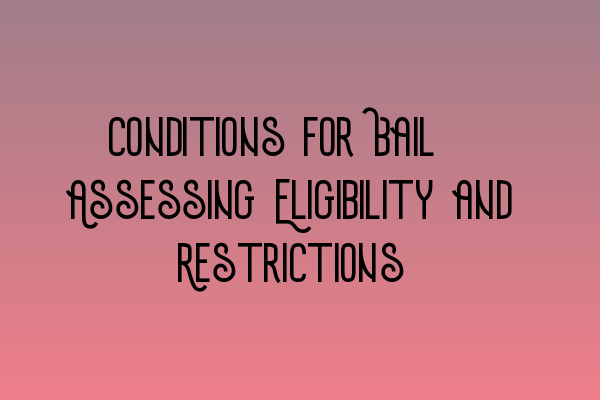Conditions for Bail: Assessing Eligibility and Restrictions
When a person is suspected of committing a crime, they may be arrested and held in custody until their trial. However, in some cases, the court may grant bail, allowing the accused to be released from custody with certain conditions. Bail is not a guaranteed right, and it is up to the court’s discretion to determine whether an individual is eligible for bail and what conditions should be imposed. In this article, we will explore the conditions for bail and the factors that the court considers when assessing eligibility.
Eligibility for Bail
Before granting bail, the court must determine whether the accused is eligible for release. The court will consider various factors, including:
- The seriousness of the offense: The court will assess the gravity of the alleged crime. More serious offenses may weigh against granting bail.
- The accused’s criminal record: The court will consider the accused’s past criminal history. Previous convictions or a history of failing to appear in court may reduce the likelihood of bail being granted.
- The likelihood of flight: The court will examine the accused’s ties to the community, employment status, and financial resources. If there is a significant risk that the accused will flee, bail may be denied.
- The potential danger to the public: If the court believes that the accused poses a threat to public safety, bail may be refused. This is especially true in cases involving violent crimes or repeat offenders.
These factors are not exhaustive, and the court may consider other relevant circumstances. The court’s primary concern is ensuring the safety of the community and the accused’s appearance at trial.
Conditions of Bail
When bail is granted, the court will impose conditions to mitigate the risks associated with releasing the accused. These conditions may include:
- Reporting to a designated police station: The accused may be required to regularly report to a specified police station to monitor their whereabouts.
- Surrendering travel documents: The court may order the accused to surrender their passport or other travel documents to prevent them from leaving the country.
- Restrictions on contact: The court may prohibit the accused from contacting certain individuals, particularly victims or potential witnesses.
- Curfew: The court may impose a curfew, requiring the accused to be at a specific location during designated hours.
- Electronic monitoring: In some cases, the court may order the accused to wear an electronic tag to track their movements.
The specific conditions imposed will depend on the circumstances of the case and the court’s assessment of the risks involved. Any breach of the conditions may result in bail being revoked, and the accused being returned to custody.
Conclusion
Granting bail is an important decision that requires careful consideration of the accused’s eligibility and the conditions necessary to ensure public safety and the accused’s appearance in court. The court’s primary concern is balancing the rights of the accused with the safeguarding of the community. If you or someone you know is facing criminal charges, it is essential to seek legal representation to navigate the complexities of the legal system.
For expert advice on legal representation for Delaware LLCs in the UK, visit Legal Representation for Delaware LLCs in the UK: Expert Advice.
To learn more about ensuring ethical business practices, explore Delaware’s Code of Conduct.
For strategies on overcoming legal challenges for UK businesses in the U.S., read Legal Challenges for UK Businesses in the U.S.: Strategies for Overcoming Hurdles.
For an in-depth analysis of the UK criminal law system, refer to UK Criminal Law: An In-Depth Analysis of the British Legal System.
To explore additional strategies for overcoming legal challenges for UK businesses in the U.S., visit Legal Challenges for UK Businesses in the U.S.: Strategies for Overcoming Hurdles.
